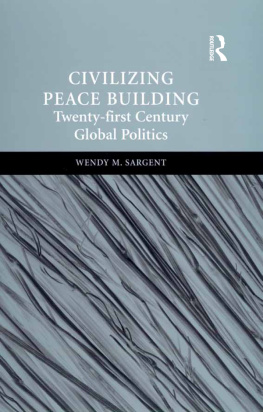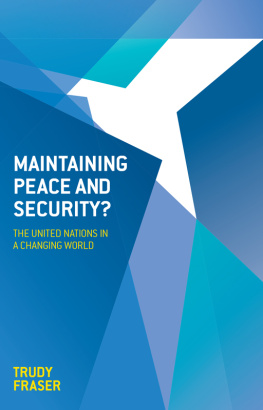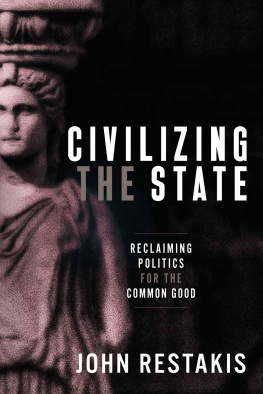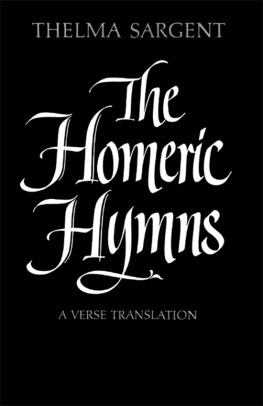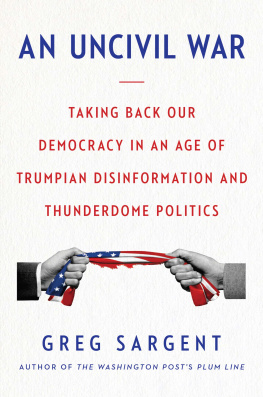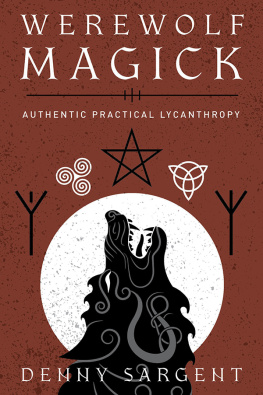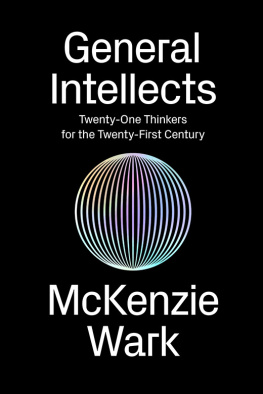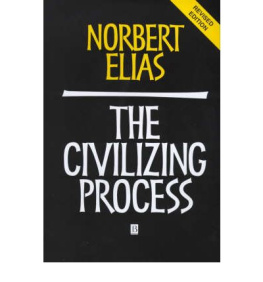CIVILIZING PEACE BUILDING
Civilizing Peace Building
Twenty-first Century Global Politics
WENDY M. SARGENT
University of Technology, Sydney, Australia
First published 2007 by Ashgate Publishing
Published 2016 by Routledge
2 Park Square, Milton Park, Abingdon, Oxon OX14 4RN
711 Third Avenue, New York, NY 10017, USA
Routledge is an imprint of the Taylor & Francis Group, an informa business
Copyright Wendy M. Sargent 2007
Wendy M. Sargent has asserted her right under the Copyright, Designs and Patents Act, 1988, to be identified as the author of this work.
All rights reserved. No part of this book may be reprinted or reproduced or utilised in any form or by any electronic, mechanical, or other means, now known or hereafter invented, including photocopying and recording, or in any information storage or retrieval system, without permission in writing from the publishers.
Notice:
Product or corporate names may be trademarks or registered trademarks, and are used only for identification and explanation without intent to infringe.
British Library Cataloguing in Publication Data
Sargent, Wendy M.
Civilizing peace building : twenty-first century global
politics
1. Peace-building. 2. Peaceful change (International
relations)
I. Title.
327.1'72
Library of Congress Cataloging-in-Publication Data
Sargent, Wendy M.
Civilizing peace building : twenty first century global politics / by Wendy M. Sargent.
p. cm.
Includes bibliographical references and index.
ISBN 978-0-7546-7040-7
1. Peace-building. 2. International relations. I. Title.
JZ5538.S29 2007
327.172--dc22
2006100198
ISBN: 978-0-754-67040-7 (hbk)
ISBN: 978-1-315-57231-4 (ebk)
Contents
Preface
When Civilizing Peace Building was in its first draft at the end of 2005, the future of projects for civilizing peace building looked very bleak. The book is a very personal one since the events that form the core of the book, the United Nations Dialogue on Civilizations Initiative, War on Terror, September 11 and Iraq War II virtually took place as the book was being born.
The book has presented assumptions that are at odds with most analysis of international relations of the twentieth century, but curiously in alignment with those writing about international relations in the twenty-first century. The twentieth century was the era of World Wars, The Cold War and the collapse of the Soviet Union. The beginning of the twenty-first century was the era of Iraqs occupation of Kuwait, and as 2001 cam to an end Islamism, September 11 and the yet unresolved Iraq War II. Most recently daily news channels have inundated us with pictures and sounds of slayings in Baghdad of Iraqis and Americans. Quietly in the background, states in Africa have continued their civil wars and former states of the USSR have continued their internal struggles amongst ethnic minorities.
However, this is not to deny that many of the opinions put forward in this book are not controversial. Raised are questions of epistemological issues fundamental to many theories of international relations that underlie present foreign policy. However, it almost seems that the events themselves of the last seven years are asking that these theories coming out of the previous century be revised.
This book also does not signify the end of the journey. Rather it is an important first step at looking at twenty-first century global politics from the perspective of peace building. Moreover, the aim was not just to look at peace building but more importantly to look at civilising peace building. This book is an opening statement. The hope is that the conclusions reached by this research will stimulate further work by the many scholars involved in the Dialogue among Civilizations Initiative. This book hopes to inspire the ongoing development of the many areas of theory and understanding drawn on by this research. The hope is that the evolution of ideas, understanding and dialogue, that will help us move safely into a better future, will continue and that those of all our world civilizations will continue to contribute to this global evolution.
Acknowledgements
My great thanks to my mother Margaret Sargent, colleagues and scholars around the world who gave their time for interviews, especially Dr James Goodman, Professor Ian Linden, Dr Josef Boehle, Dr Scott M Thomas, Professor Jeff Haynes, Professor Said Amir Arjomand and Mr Giandomenico Picco. The members of University of Technology Sydney, members of the United Nations NGO, Brahma Kumaris involved in peace building. Finally yet importantly, the many people involved in the Dialogue among Civilizations Forums over the years from the international and Australian community.
Introduction
The following introduces the main elements of the framework of the argument, background experience of the researcher, the methodology and research process used in this book. Then a history of peace research in international relations discusses some of the established institutes, and published research of relevant journals. This will help clarify the position of this book in relation to the field of peace research.
Following that is the framework of the argument that clarifies the theory base, main issues and underlying assumptions contested. The action research methodology used for the book is explained. Also described is the background experience of the researcher that has informed the overall choice of subject and methodology. Finally, a brief outline of each chapter allows the reader to understand their content and structure and how these relate to the overall argument.
Central to the analysis, are explorations of the challenges of a post Cold War world, where old ideologies and alliances are being reformed, and national boundaries are being redrawn. Attali outlines the urgent nature of the post Cold War challenge.
Generally speaking, when empires collapse or a world order dissolves, humanity has a very short breathing space in which to reorganize its international institutions, as happened in 1648, in 1815, in 1920 or in 1946. Unfortunately, that was not done. Right after the end of the Cold War there was a window of opportunity, but we did not take advantage of it. Why not we thought that the West had won We deluded ourselves that market forces and democracy will ensure an irreversibly stable order in the twenty first century (Attali 2001, 378).
A brief history of peace research will lend insight to an area of research connected with the approach used by this book. Peace research, as practiced today, started as an exploration of the idealism of progressive beliefs and values of liberal idealism in the Twenties and early Thirties. Central to the study of peace research, according to Cox and Scruton are the disciplines and areas of study of philosophy (especially ethics), logic, probability theory, decision theory, game theory, strategy, theology (just war), history, economics, sociology and politics (Cox and Scruton, 1984, 12). These are illustrated in the work of Lewis Fry, Richardson, Pitirim Sorokin and Quincy Wright. The large area of theory covered by peace research is full of unresolved debates and outcomes. Such debates reflect a concern for peace research that has a commitment to shifting the world political system as a whole in the direction of universal and permanent peace (Bull, 1972, 46).


